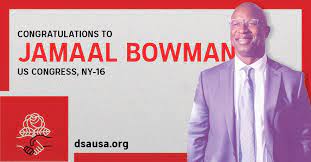Within the Democratic Socialists of America – especially the very online parts of DSA – there’s been a hot debate lately over whether to expel Jamaal Bowman from the org. Bowman recently won an election to Congress, joined The Squad, and formed a big part of the DSA’s strategy of building membership through electoral engagement.
I won’t recap all the details. Readers can check out coverage from the DSA Observer. But the basic story: Bowman voted for Iron Dome funding for Israel. He took a lobbyist-paid trip to Israel and posed with Israel’s right-wing prime minister, among other things. In response to a rebuff from Bowman and his supporters, the DSA’s Palestine Solidarity Working Group called on him to fix these issues or face expulsion. Some on the online left sided with the WG, while other parts sided against expulsion.
But I think the whole expulsion question arrives far too late. The DSA should look into how it got into this mess in the first place.
Bowman Is the Wrong Question
So, the expulsion question comes too late. Here are two questions that, well answered, would shed far more light on how DSA got into this mess and what it should do about it:
1. How did the DSA come to endorse and elect a member to Congress who disagrees with it on issues of internationalism and solidarity?
2. Should the DSA make Congressional elections (and elections in general) so central to its strategy of gaining new members and building the org?
Why these questions? Because they get at the fundamental issues that led to calls to expel Bowman. The DSA relies a lot (frankly, almost entirely) on publicity from elections to survive and grow. At the same time, the DSA doesn’t really have any solid plan for how to use elections to build power. And so, the problem with Bowman barely skims the surface.
In fact, the DSA hit the Bowman Problem at the state level in Virginia with Lee Carter. And I’ve heard reports of similar issues at the local level in various places.
Some factions within DSA want to ‘solve’ the problem by tightening up endorsement criteria. But that doesn’t get at the fundamental issue, either. At its deepest levels, the issue concerns how to build power.
DSA: Big Enough to Win, Not Big Enough to Lead
We know the DSA is big enough to win elections, even at the federal level. Four of its members serve in Congress, with AOC leading the way. More recently, Cori Bush and Bowman himself won big elections as DSA members.
But the DSA isn’t big enough to win by itself, or even to form the most powerful bloc in the coalition of a member of Congress. And therein lies the problem. Bowman seems to have several powerful blocs of support outside the DSA, notably the Justice Democrats, Sunrise Movement, and Working Families Party, among other groups. And it looks like he places non-DSA groups central to his campaign and time in office. Furthermore, from the perspective of a House member, that’s not exactly a big surprise. That’s what members of Congress do. They place their most powerful supporters at the center.
If the DSA hopes to build a more unified Congressional caucus, it has to grow to the point where it can form the most powerful bloc within the coalition of a member of Congress. And it’s not there yet.
In the meantime, the DSA’s move at the 2021 National Convention to build a platform made a lot of sense. That provides some clarity for future members who want to serve in office. But the size issue remains. The DSA won’t become powerful enough to meaningfully engage at the federal level until it builds active membership. And it will only do that by engaging in and winning local fights.
Toward Answering Those Other Two Questions
And so, that leaves us with those other two questions. I don’t have all the answers, but I think they’d make a valuable focus for DSA.
On the first question, I had a brief but informative exchange on Twitter with a former member of DSA’s National Executive Committee. She served during the time of the Bowman endorsement. As she told it – and I take her at her word – at the time of the endorsement, Bowman said he opposed all US funding of Israel.
And so, it looks like Bowman moved to the right after he won the election. This puts much of the fault on Bowman himself rather than on the DSA.
But the second question gets more thorny. It shouldn’t come as a shock to many readers that I answer it “no.” I think elections should come rather late in the process of building the DSA, especially federal elections. It’s OK to use a federal campaign to build members once in awhile, but it should be at most one of many strategies. And it shouldn’t be the most important one. A federal campaign can build lots of members quickly, but usually softer members. Plugging into local battles will build harder membership and power.
At the risk of confirmation bias, the Bowman dust-up provides support for my view. The DSA can expel Bowman all it wants. But for Bowman, dropping the DSA is less dangerous than angering more powerful backers. I don’t think the DSA will expel Bowman. But I think he might leave the DSA on his own.
Without a growth in DSA’s power, the problem with Bowman will likely re-emerge with other DSA elected officials. I’m surprised it hasn’t already emerged with AOC.
